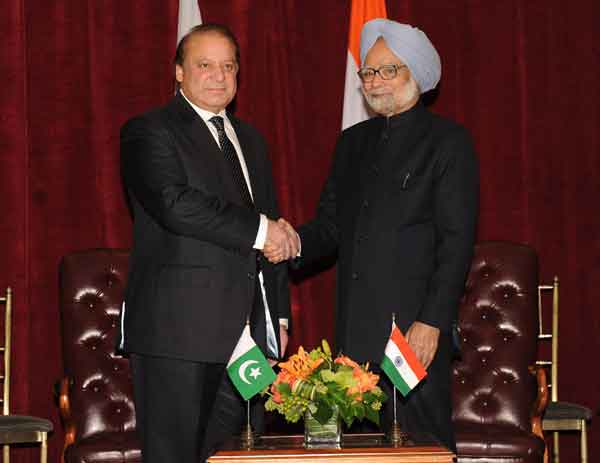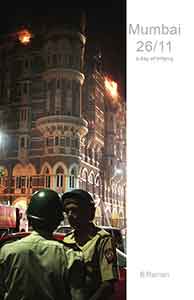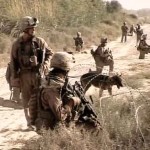
The Prime Minister, Dr. Manmohan Singh in a bilateral meeting with the Prime Minister of Pakistan, Mr. Nawaz Sharif, in New York.
In the face of the recent revelations by well-placed sources that the Manmohan Singh government has been underplaying a series of border intrusions by and effective loss of Indian territories to China, it is understandable if many Indians do not exactly believe the Indian Army Chief Bikarm Singh when he asserts that the Indian troops have driven away and killed the Pakistani inflators in the Keran sector of Kupwara in Jammu and Kashmir after nearly a fortnight-long battle. And it is all the more so when for the first time in Independent India’s history, the present government has systematically tried to create factions within the Army and leaked military secrets for petty political gains. General Singh is, however, spot- on when he says that the Pakistani Army and ISI need to be made “accountable” and forced to rein in their “nefarious agenda of actively supporting” jihadis factories churning out terrorists to wage covert war against India.
…ever since Sharif was elected last May as Pakistan’s new political executive for the third time, infiltration into India has increased, resulting in two major ambushes of our soldiers.
But who will rein in these jihadi elements in Pakistan? The recently elected Prime Minister Nawaz Sharif? Well, that is what our Prime Minister Manmohan Singh and idealistic peaceniks think so. That was the reason why despite growing public pressure to the contrary, Manmohan Singh met in New York last month. But what have been the concrete results? Nothing. And this brings me to the issue of the limitations of peace talks with Pakistan. Let me explain the issue through the following question-answer format.
Question: Is Sharif a man of peace?
Answer: One is not absolutely sure.
There is no doubt that the Pakistani Prime Minister has on numerous occasions talked of the virtues of peace with India. But he has not been implementing what he says. He signed the “historic” Lahore-Accord with then Prime Minister Atal behari Vajpayee in 1999. But it was immediately followed by Pakistan’s adventure in Kargil and the resultant fourth war against India. Of course, he blames his then Army Chief Pervez Musharraf for stabbing him in his back, but the latter has a different story to tell. There are reports that the planning for Kargil-invasion was very much in the knowledge of Sharif. Only history will tell who- Sharif or Musharraf- is right.
Similarly ever since Sharif was elected last May as Pakistan’s new political executive for the third time, infiltration into India has increased, resulting in two major ambushes of our soldiers. There has been an increasing regularity with which Pakistani soldiers violate the ceasefire across the Line of Control (LoC). In fact, Pakistan has violated ceasefire more than 120 times so far this year, the highest since 2003 when both countries agreed on the border truce. Around 93 violations took place in 2012, 51 in 2011 and 44 occasions in 2010. Likewise, since Sharif came to power, Pakistani diplomats have been hyperactive in internationalizing the Kashmir issue. In fact, Sharif himself spent considerable time in discussing Kashmir in his speech at the United Nations, just before meeting Manmohan Singh at New York.
If one looks at Nawaz Sharif’s political past, it becomes obvious that he has always been comfortable with the Islamists.
Question: Can Sharif control anti-India extremists at home?
Answer: Highly unlikely.
It is because his electoral base consists of fundamentalist extremists in a big way. Under his present term, Pakistan has witnessed serious ethnic cleansing of Shias and Christians, not to speak of the growing incidents of terrorist incidents by the Pakistani Taliban(Tehrik-e-Taliban or TTP) , the very group which, along with Ahle Sunnat Wal Jamaat (ASWJ), supported him during the elections. The ASWJ is the mother organisation of the Lashkar-e-Jhangvi. No wonder why Sharif’s party-led government in Punjab openly finances the extremist organisations. No wonder why Hafiz Muhammed Saeed, who has a $10m bounty on his head, put up by America for his alleged role in masterminding deadly attacks in Mumbai in 2008, marked Pakistan’s national defence day on September 6th by leading thousands of his followers to a rally in the capital, Islamabad. And no wonder why Sharif government is silent on the growing demands that Pakistan is governed by Sharia laws, not by the man-made constitution.
If one looks at Nawaz Sharif’s political past, it becomes obvious that he has always been comfortable with the Islamists. During the election drive before the 1988 polls, which were held after Gen Zia’s death, his main campaign slogan was to fulfill the unfinished mission of “Shaheed Ziaul Haq”. As Nawaz lost the election and Benazir Bhutto came into power, he took the support of Osama bin Laden to topple her government. Osama was a big supporter of the Islami Jamhoori Ittehad and Nawaz Sharif, who was the IJI president at that time. In fact, according to former ISI official Khalid Khwaja, Nawaz Sharif had met bin Laden in Saudi Arabia three times in his presence and received funds to topple the first Bhutto government.
Of all the political parties in Pakistan, Sharif’s Muslim League has been at the forefront in advocating for co-opting the jihadists and fundamentalists in the country’s political system. And its way to do that is to take recourse to Islam. In this it has found support both from the country’s judiciary and armed forces. In one of his judgments Pakistan’s Chief Justice Iftikhar Muhammad Chaudhry reportedly asked. “Should we accept if tomorrow Parliament declares secularism, and not Islam, as the state policy?” Another judge joined him in asking, “Will it be called a rightful exercise of authority if tomorrow parliament amends Article 2 of the constitution which states that Islam will be the state religion?” Similarly, the Army Chief, General Parvez Kayani, is on record to have stated once: “Pakistan was founded by our forefathers in the name of Islam and we should work to strengthen the country and make committed efforts to achieve the goal of turning it into a true Islamic state…..our faith, resolve and pride in our religion and in our country is an asset, which is further reinforced after each terrorist incident”.
There are two areas on which the Pakistani Army can never surrender its absolute control to any civilian government: policy towards India and nuclear weapons.
All this has ominous implications for India.
Question: Can Sharif negotiate peace with India?
Answer: Unlikely.
It is because no civilian government, least of all the one under Sharif, has any real say in the policy towards India. The ultimate decision maker in Pakistan in this regard happens to be the Army Chief. Therefore, if any breakthrough in the India-Pakistani impasse is to be made, the Pakistani Army has to be in the picture. There are two areas on which the Pakistani Army can never surrender its absolute control to any civilian government: policy towards India and nuclear weapons.
Secondly, it is a huge myth that if the Kashmir issue resolved as per Pakistan’s wishes or terms, there will be peace with India. “Seeking parity with India” has been Pakistan’s obsession right since its inception. As per this obsession, if India has nuclear weapons and missiles, Pakistan must have them, even if in the process, as former Prime Minister Z A Bhutto said, “the Pakistanis have to eat grass (to survive)”. For seeking parity, Pakistan will also like India to be reduced to her size; so Islamabad supports each and every separatist group in India. In other words, erosion of Indian power and its dismemberment are Pakistan’s prominent foreign policy goals. In fact, Mushahid Hussain, once a former information minister under Sharif, has argued that Pakistan should work towards the division of India into three or four independent countries.
In “Pakistan: Beyond the Crisis State”, a highly readable volume, edited by Dr Maleeha Lodhi, a leading Pakistani academician, who once was her country’s ambassador to the U.S., one comes across how Pakistani nationalism is India-centric; Pakistan is scared of multiple identities, it rejects indigenous cultures. Worst of all, it is confused. It often plays jump rope between being Muslim and being Islamic, being Indian and being Arab. Of course, the book reposes great faith in the rising middle class of Pakistan, which, it argues, is going to have a more rational brand of nationalism, not tied with India-centric history (that is full of venoms against Hindus). But that is unlikely, given the rising fundamentalism in Pakistan. In a country, if a serving governor of the largest province (Punjab) and a central cabinet minister are assassinated by the fundamentalists but none in the government dares to attend their funerals, the judge who pronounces punishment for the murderer is forced to be banished from the country, and yet the urbanised middle class tolerates all this, it speaks volumes of its capacity.
And when one talks of the fundamentalists, they are very clear that Pakistan’s real enemy is a democratic India. They cannot be satiated by their victories just over Afghanistan and Kashmir. They want to rule over the entire Indian subcontinent. The Pakistani Army is perfectly in tune with this philosophy.
Question: Given the above harsh truth, should India talk to Pakistan?
Answer – Yes, but do not expect any results.
Talking is important for three reasons. One, it will strengthen the peace-constituency in Pakistan, howsoever small and inconsequential it may be at the moment. Secondly, it will help in neutralizing the pro-Pakistan elements in the Western countries, particularly the United States, Pakistan’s largest source of economic aid and military assistance. Thirdly, it will give us time and space to augment our economic and military power to not only face any eventual hot war from Pakistan but also develop the capacity to manage the situation following the disintegration of Pakistan because of its inherent contradictions, which, to me, is a distinct possibility.





